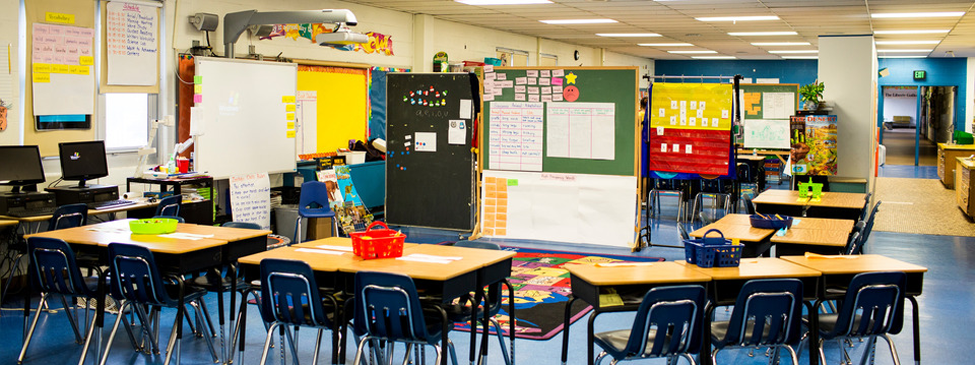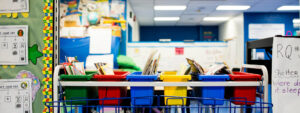Inspired by her ongoing journey to get her son the education she wanted for him, Lia Martin became an advocate for parents of kids with disabilities.
Kim McCann Fultz moved from Brooklyn to a small town in rural Ohio in hopes that the new setting would be beneficial to her son Micah’s learning and social life, and to be closer to family. But Kim and Micah aren’t yet satisfied with his progress.
In their monthly parent's support group, and beyond, Lia and Kim regularly discuss the joys and challenges of raising kids with disabilities and support each other in their advocacy work. We joined in on one of these conversations to get their take on the importance of holding students to high standards—academically, as well as social-emotionally.
TNTP: As mothers of children with special needs, you’ve both expressed how important it is for you to understand the expectations for your sons in school—as well as how they’re supported to meet those expectations. Can you talk a little bit about why that matters?
Lia: I’ve wanted an excellent education for my son from the moment he was born, but when he entered kindergarten, and I learned he had special needs, it became even more important for me to be able to say, with confidence, that he’s doing well. It’s been tough making sure he’s held to high standards, and I’ve had to go to great lengths—selling my home and quitting my job—to make sure that happens.
[subscribe]
Success looks different for different kids. And for Taylor, making sure he’s thriving goes far beyond what's going on in a single math or English classroom. For example, he tends to connect with two-dimensional art and loves drawing. We've used that in the classroom—allowing him to sketch during lessons—because he's actually more engaged when he’s doing art. This sort of thing—helping our kids learn what they need to do to focus and be productive members of society—is so important. When we gave Taylor the option to draw in class, we weren’t just making it easier for him to do his assignments, we helped him learn a skill that could help him for the rest of his life. Now, he’s better able to focus in any situation, inside or outside of school.
Sometimes, particularly for kids in special education programs, the standards they’re held to at school aren’t as high as parents want them to be. Both Kim and I want our sons to attend college; we want them to do more than just achieve the minimum standard. But to get there, we have to create a path that works for our kids—and the path has to include these social-emotional pieces.
Kim: On the first day of school when most parents are excited for their children to have more structure, I worry. My son is going to be in fifth grade this year at the same small school he’s attended since kindergarten—everyone knows him, which helps. I’ve had a different journey than Lia, but our stories have a lot in common; every year it’s a struggle to make sure he’s learning what he should be, and I don’t expect that to change anytime soon.
Academic standards have made it easier for me by giving me a better idea of what a “good education” looks like. But, as Lia said, it’s not just about academic standards—it’s also about thinking creatively and prioritizing emotional learning and life skills, too.
We’ve found that when we incorporate music into my son’s math lessons, he’s more focused, he's calmer, and it puts him in a position to learn the other curriculum. If we’d settled with how he was doing in math before and weren’t open to trying new things, he might never have learned how to use music to help him focus. I’ve seen all types of kids benefit from being held to high standards—but I think they might be even more important for children with special needs. They’ve certainly been important for my son.
TNTP: So, standards have helped you both measure your kids’ academic progress. How do you know when they’re doing well when it comes to their social-emotional development?
Kim: I think a lot about whether or not Micah is making friends—that part is so important because in my experience if kids don’t feel connected with their peers it’s difficult for them to thrive in any subject.
There aren’t the same sorts of assessments testing students’ emotional readiness as there are testing academics, and social-emotional learning doesn’t show up on a report card—so it’s harder for us to be sure our kids are on-track in that area. Like many other parents, Lia and I write social-emotional standards into the IEP, and at the IEP meetings, we make it a point to ask specific questions about how our kids are doing against these standards since we’ve seen them overlooked in the past.
Lia: Taylor is going to middle school soon. Yes, I want him to have the academic knowledge he needs to do well, but it’s just as important to me that he has a prom date—and prom dates aren’t written into any state standards I know of. I’m not saying they should be, but we need to start thinking more about social-emotional standards for all kids, especially those with special needs.
One year, I put him in a supplemental academic program at the local college, to work on his reading. It did help, but he really wanted to be part of the after-school program at his school where he could hang out with friends. The reading program interrupted that, and he asked not to do the academic program again the following year. That next year, when he went back to the after-school program, his academics slipped a bit. It’s like a puzzle that looks different every year because kids grow and change. It would be great to have the same type of support with social-emotional learning that we do with academics—it would make the puzzle easier to manage.
TNTP: Can you tell me about a time when your sons have been supported to grow socially in school?
Kim: The principal at my son’s school, he's very hands-on; he's always around the hallways and visits classrooms every day. He gives out these 'Caught Being Good by the Principal’ awards to kids he sees doing something nice—all kids, not just those in special education. At the end of the week, the names of kids caught being good are announced over the loud speaker, and the kids go down to the principal’s office to get certificates and prizes.
Last year, during the first week of school, my son got caught being good. It set the perfect tone for the school year; everyone knew his name, and his first trip to the principal’s office was a celebration. He was so proud of what he’d accomplished, and it made the transition into the school year much easier.
Lia: Taylor happens to be motivated by prizes. He was having trouble staying in his language arts classroom, and his teacher came up with a game where the whole class would win a prize if Taylor stayed in his seat. Taylor got to decide the prize—he chose a pizza party—and how long he had to stay in his seat to get points for that day.
Putting him in the position of power and giving him ownership of the goal helped a lot. I also thought it was really smart and empathetic of the teacher to get the whole class involved. I know some parents don't want their kids to stand out, but Taylor was already standing out, and he likes standing out, so it worked for him. If he was getting antsy, one of his classmates—because they wanted to win too—would say, “Hey, Taylor. What do you need?” It ended up being a great team building activity for the class.
Taylor and everyone else got so excited about it that they won the party. His grades and behavior also improved—and he made some new friends.
I don’t want to be one of those parents whose child graduates from high school and can’t do well in college because they never learned to be independent. I want my son to be challenged intellectually and socially, just as he will be for the rest of his life.
TNTP: You mentioned inclusivity. Can you talk more about that?
[related]
Lia: Inclusivity matters so much to me. At the end of the day, what social-emotional learning means to me is that Taylor is able to feel a sense of community; that he feels included. The skills he learns in class with friends will be useful for the rest of his life. He may not acquire these skills as quickly as his peers, but he won’t acquire them at all if he isn’t given the opportunity to make friends—with all types of students. By being around kids who already have certain social-emotional skills, Taylor is able to learn and practice these skills. And by spending time with Taylor, other kids improve their social skills, too.
Kim: I completely agree, Lia. The flip side of that, of course, is when our kids aren’t included, it’s a matter of civil rights—this part is really heartbreaking to me. When Micah’s needs aren’t being met in the classroom, it’s against the law, and I believe it’s my responsibility to hold our leaders accountable.
I’ve written to my son’s Principal and SPED coordinator about this, as well as an education consultant at our county’s board of developmental disabilities. I would like to close our conversation by sharing that letter:
Dear Lucy (name changed),
I hope all is well and you are enjoying spring.
I would like to schedule another IEP meeting for May so we can talk more to Micah’s fifth-grade teachers and decide on the right education plan for him. I left the last IEP meeting feeling unsatisfied with what we came up with, as well as confused and conflicted.
On the one hand, I appreciated the honesty from the principal and teachers about integrating him into science class. On the other, the way they approached it—with a huge stack of books and binders—and the words they used—lots of technical jargon that I understand, but feels impersonal—was discouraging.
The idea behind inclusion is that every child is an equally valued member of the school community; I imagine parent teacher meetings with students in general education don’t look like mine did. I want to figure out how to successfully transition Micah into general education, but to do that we need to treat him like a kid—and not like a list of diagnoses or a case file.
I want Micah to flourish. I want him to grow into an independent and happy adult. Children with disabilities benefit from learning in a general education classroom, while their peers benefit from being in class with children with a diversity of talents, backgrounds, and temperaments. To me, this isn’t just about getting my son the education he deserves; it’s also about creating a school and community culture that treats all kids with respect and dignity.
Thank you for your help,
Kimberly McCann Fultz





